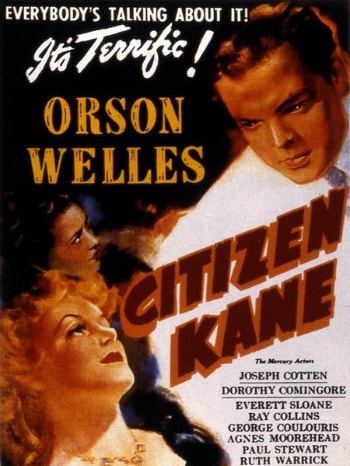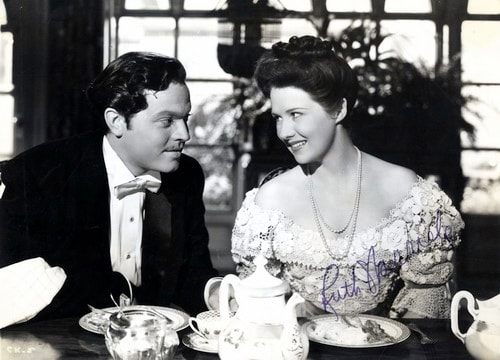'Citizen Kane' - a great movie about journalism
The work that always leads the polls of the best movies of all time is the movie that editors and reporters working in the profession all find themselves in.
Citizen Kane, released in 1941, topped the American Film Institute's list of the 100 Greatest Films in 1998 and 2007. It was also included in the National Film Registry's first list of films in 1989. The film has also topped many other polls.Editorial Jaquar, FIAF, French Critics, Romanian Critics, Time Out, Village Voice… Special,Sight & Sound,The most prestigious of all film polls (in the words of the late critic Roger Ebert), also honoredCitizen Kanewas the “Best Movie of All Time” for five consecutive years from 1962 to 2002.
 |
| "Citizen Kane" is a black and white film, released in 1941. |
Citizen KaneThe story begins with a shocking news that shook the entire United States: Charles Foster Kane had died. The front pages of all the newspapers that day reported and reviewed the highlights of Kane's life: How he built a powerful media empire that included 37 newspapers, two news syndicates, and a radio station? How Kane ran for president and almost became the President of the United States? The newspapers also did not forget to recall Kane's final years of life, living in solitude at the Xanadu mansion. Before his death, Kane uttered only one word, which remains a mystery to this day: "Rosebud".The film tells the story of the triumphs and tragedies of Charles Foster Kane, an American media tycoon. The film's plot, details, and the scandals surrounding it can be considered excellent examples of journalism.
Being a biographical film but summarizing the main character's entire life right from the beginning of the film, it seems like there is nothing new about Kane for the audience to discover. The film can only operate because of a newspaper's curiosity and dissatisfaction. The editor of that newspaper thought that "just saying what a person does is not enough, we must clarify who that person really is." He assigned a reporter named Thompson to investigate the meaning of Kane's last words. The film is told in flashbacks of all those who knew Kane that Thompson could contact to interview.
Through many stories, Kane's portrait gradually emerged clearly. First of all, he was a journalist with an open mind, progressive, daring to commit to his profession. He was willing to sleep right in the newsroom to report on the news. Many times, Kane stayed up all night to edit articles in time for the next issue. He recruited talented people, looking for the best reporters to work. Kane established the "Declaration of Journalism Principles": "I will give everyone in this city a newspaper that will tell the whole truth. I will also give them a fighter for their rights as citizens and as human beings."
He is willing to publish sharp investigative articles, even if it affects the interests of the company in which he is the largest shareholder. He dares to publish articles criticizing the US President even though his first wife is the President's niece.
 |
| "Citizen Kane" is a movie that anyone working in the media or journalism industry should see. |
Watching the film, the audience not only admired Kane but also loved the enterprising reporter Thompson. As the person assigned by the editorial board to investigate the secret surrounding “Rosebud”, Thompson was not afraid of difficulties, ready to go to the bottom of the truth. He studied the memoirs of Kane’s sponsor, interviewed all the people who knew the character. When he was refused a meeting, Thompson was not discouraged but tried every way to carry out the task assigned by the editorial board.When a journalist wrote a critical article criticizing his wife's opera singing, Kane not only did not get angry but also laughed in agreement. He himself completed the article in the direction the reporter had initiated. Perhaps because of his passion for journalism, Kane's two marriages failed. He had little time to care for his family. He came home late, spent too much time at the newsroom, busier than a sailor.
Of course, Citizen Kane is not only a film about journalism. It is also a story about the ups and downs in a person’s life, about the feeling of “I long to love someone but cannot love”. However, this will be the film in which every editor-in-chief and every reporter struggling with the profession will find their own image.
The film was based on the life of media tycoon William Randolph Hearst. For this reason, film history must record one of the most unequal battles between media and art. Hearst played every dirty trick, using all the power of his media empire to sink the film.
Hearst openly threatened the film industry and specifically RKO in every way. The studio bosses were forced to hold an emergency meeting and offered $800,000 with the intention of buying and destroying Citizen Kane. RKO refused the offer, and Hearst then banned all Hearst newspapers, radio stations, and television stations from commenting or even mentioning the name Citizen Kane. Many cinemas, fearful of the enormous power of the Hearst empire, withdrew the film. This was a fatal blow that led to the film's failure at the box office. Not only that, Hearst also influenced the Oscar jury that year. Despite receiving 9 nominations, Citizen Kane eventually had to go home with only one award for screenplay.
The story surrounding Citizen Kane is a classic example of the enormous power of the media. In that unequal battle, Hearst and his empire temporarily won. But “give to Caesar what belongs to Caesar”, glory must be returned to the one who deserves it.
After many years of oblivion, it was not until the mid-1950s that the film began to be shown again on American television. Critics warmly welcomed Citizen Kane. It is one of the rare films to receive a 100% positive rating on Rotten Tomatoes, a reputable website that compiles reviews from critics.
Movie Guide writer Leonard said that this film “breaks all the rules and creates new ones… A masterpiece in every sense of the word.” Famous critic Roger Ebert called Citizen Kane “The Greatest Movie Ever.”
Citizen Kane is celebrated for its almost unprecedented use of reverse chronological storytelling, following the characters' flashbacks. The film also featured many breakthroughs in cinematography, such as the use of low angles, deep focus shots, and backgrounds as clear as the foreground. Many scenes of the film used the same setting, keeping the same characters, only changing costumes and dialogue. In this way, changes over many years were compressed into a few minutes smoothly.
Citizen Kane is also highly regarded for its use of music. Filmmaker Francois Truffaut even commented: “Before that, no one in Hollywood knew how to use music effectively in films… Citizen Kane was the first, in fact the only, film to use sound techniques.”
 |
| The film always leads in cinema polls. |
Mentioning the success ofCitizen KaneIt is impossible not to mention the “master engineer” Orson Welles. He was the producer, director, co-writer, and main actor of the film. Such a title for a 25-year-old who had just started his career in cinema was an unbelievable feat. Welles received the “Lifetime Achievement” award from the American Film Institute in 1975. The British Film Institute also voted him the greatest director of all time.Film critic VGI Bijovitch once used glowing words to praise the film's script: "It makes people amazed by its undisguised, courageous look at life, by its cold and bitter narrative voice, by its rejection of illusions, by its stubborn readiness to wait for the worst."
As the reporter Thompson in the film once said: “No single word can explain a whole man’s life.” Similarly, a small article cannot explain the enormous scale of a film.
Citizen Kane is a masterpiece of cinema that has left a lot of influence on later films. This is truly a work that cannot be missed by those who are passionate about the seventh art as well as those who have, are, and plan to devote their lives to journalism.
According to VnExpress.net






